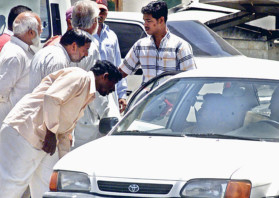
ABU DHABI: Despite regular crackdowns, illegal taxis are thriving in Abu Dhabi. Unmindful of the law, they are making the most of the extended Eid break, ferrying hundreds of passengers to neighbouring emirates and back.
“We make five times more than what we normally do in a week. Eid holidays give us the best business,” said Mohammad Haneef, who operates such illegal taxi.
Another illegal taxi driver, Mustafa Khadim, said he earns up to Dh5,000 a week during Eid. “It is a windfall for us. Most people plan to visit friends or family staying in far-off towns for Eid,” said Khadim.
Drivers can be seen brazenly calling out destinations and fares to woo passengers near the city bus terminal. Their cars, mostly with Dubai and Sharjah registration numbers, were parked nearby when XPRESS visited the place.
The industrial area of Mussfah is also a hub for illegal taxis, mainly because of the concentration of blue collar workers.
“It is risky. But this is how I earn a living,” said Haneef. “To avoid suspicion, we dress up well. Passengers are instructed to pretend they are our friends or roommates hitching a ride,” he added.
Taxis in Abu Dhabi are regulated by the Abu Dhabi Centre for Regulation of Transport by Hire Cars (TransAD), a government organisation established in 2006. Running an illegal taxi service is a punishable crime and can invite a fine of between Dh5,000 and Dh10,000 or a 30-day jail term, or both.
In the first five months of 2014, Abu Dhabi police fined 2,000 peope for illegal passenger transport. All violators were Asians and many of them were repeat offenders.
Colonel Tariq Al Ghoul, head of Department of Transport at the Abu Dhabi Police, said the crackdown was carried out in response to complaints from people who had used the service in the past.
TransAd has repeatedly warned residents not to use unauthorised taxis as they are are not equipped for the safety of passengers and may not even be insured. And since the drivers are not linked to an employer they cannot be easily prosecuted in case of a problems.
However, passengers seem to have no qualms using them.
“They are much cheaper than licensed taxis. I do not see any problem using them,” said Altaf Jassummudhin from Bangladesh.
“I am visiting friends in Fujairah and they are charging me just Dh40 to share the car with a few others” he said.
Many expats routinely use shared taxis to travel to neighbouring emirates like Dubai or Sharjah as it works out cheaper. An unlicensed taxis charges Dh130 for a ride to Sharjah. A licensed taxi costs nearly twice as much for the same trip.
Filipino sales executive Ronaldo who uses a shared cab to go to Sharjah thrice a week said: “It costs me Dh30. Why would I pay more for the same service?” he reasoned.
An Indian heading to Dubai to said he was taking a shared cabs out of compulsion. “The buses arec crowded becuase of Eid holidays and regular taxis are beyond my budget. If I am caught I will say I know the driver,” he said
Several women commuters were also seen hailing illegal taxis.
“It’s not the right thing to do and it may not be safe, but it’s convenient as waiting for a bus takes often takes half an hour,” said Indian housemaid Sreelatha.
You Speak
What can be done to discourage people from using illegal taxis?
Have you had a bad experience with a illegal cab driver? Tell us about it
Write to us at:
editor@xpress4me.com
sms 5101


